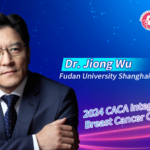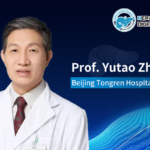
Editor's Note: From July 5-7, 2024, the "2024 Annual Progress in Clinical Oncology Conference (BOC) and Best of ASCO® 2024 China (BOC/BOA)" was grandly held in Guangzhou. In the field of breast cancer, this conference highlighted key advancements from the American Society of Clinical Oncology (ASCO) annual meeting, showcasing China's research impact on the international stage. "Oncology Frontier" interviewed Dr. Qiang Liu, host of the breast cancer session and from Sun Yat-sen Memorial Hospital, Sun Yat-sen University, to share session highlights and impacts, pointing out future trends in breast cancer treatment development. 01
Oncology Frontier: As one of the organizers of the BOC/BOA breast cancer session, could you share the significant studies and highlights from this session and their important implications for clinical practice?
Dr. Qiang Liu: The 2024 ASCO annual meeting featured numerous groundbreaking studies, many with potential significance and value for future treatment approaches. At this year’s BOC/BOA conference in Guangzhou, Chinese scholars discussed these impactful studies together. It is evident that in recent years, China’s research has advanced rapidly, with scholars and enterprises working together to produce many significant research results. For instance, in the cutting-edge field of antibody-drug conjugates (ADC), innovative ADC drugs targeting HER2 and TROP-2 have been developed, with corresponding phase III clinical trial results achieving impressive outcomes. These accomplishments reflect the ability of Chinese scholars to keep up with and even lead global advancements. Chinese enterprises are also strengthening their collaborations with scholars, achieving numerous successes and making strides on the global stage.
02
Oncology Frontier: How do you view the current state of international cooperation and exchange in the field of breast cancer? Could you share some successful cooperation cases?
Dr. Qiang Liu: A decade or so ago, European and American countries were far ahead in breast cancer research compared to China, holding a leading position internationally. At that time, Chinese clinicians mainly played the role of students, learning from international clinical research and formulating treatment strategies for breast cancer patients based on foreign guidelines. However, in the past 5-10 years, the research level and outcomes of Chinese scholars have advanced significantly. Simultaneously, China’s international standing in breast cancer has been rising, with scholars gaining more influence globally. For example, the expert panel of the St. Gallen International Breast Cancer Conference now includes four Chinese experts who will discuss hot topics in early breast cancer diagnosis and treatment at the biennial meetings, voting on key issues lacking evidence-based medicine to form new international expert consensus on breast cancer. I am also honored to be a member of the ESO-ESMO International Consensus Group for Young Breast Cancer, participating in formulating international consensus on young breast cancer. Additionally, many Chinese experts actively engage in international exchanges and cooperation, achieving notable accomplishments.
With the release of more large-scale randomized controlled clinical trial data and the development of new drugs, China’s research level in breast cancer is gradually improving. Today, China is running alongside, and in some areas, leading Western countries. Many drugs developed by Chinese enterprises are being promoted globally, benefiting more breast cancer patients worldwide. Chinese scholars have played an indispensable role in this progress. In the future, we must further strengthen international cooperation and conduct more large-scale international clinical studies to benefit more breast cancer patients globally.
03
Oncology Frontier: How influential is current Chinese breast cancer research on the international stage? Which important studies at this ASCO meeting impressed you the most and are worth further exploration and reference?
Dr. Qiang Liu: In recent years, aside from advancements in the ADC field, China has achieved considerable progress in developing new targets and drugs and in precision treatment related to circulating tumor DNA (ctDNA), enhancing international breast cancer diagnosis and treatment standards.
This ASCO meeting included several sessions that particularly discussed ctDNA-related advancements. The MonarchE study analyzed ctDNA from 910 patients, exploring how to further precisely screen high-risk early-stage patients. This study is currently the largest ctDNA-related study in the HR+/HER2- breast cancer field, showing that 87% of ctDNA-positive patients experienced invasive disease-free survival (IDFS) events, indicating that ctDNA testing is an effective method for identifying and enriching high-risk patients.
At the BOC/BOA conference, we also had an in-depth discussion on this study. Nowadays, the cure rate for early-stage breast cancer can reach 70-80%. Providing more detailed stratification and accurately identifying high-risk patients for intensified treatment will bring more benefits to patients. Significant progress has been made in intensifying adjuvant treatment for various breast cancer subtypes, and further accurately screening patients needing intensified treatment is a crucial future task. ctDNA has shown excellent potential in this area.
04
Oncology Frontier: Could you introduce the current research directions your team is exploring, and their progress and outcomes?
Dr. Qiang Liu: Personalized precision treatment for breast cancer has become a major development trend. In April this year, an article in JAMA reported that some early-stage triple-negative breast cancer (TNBC) patients could even be exempt from chemotherapy. This study included 1,966 stage I-II early TNBC patients, showing a five-year distant relapse-free survival rate exceeding 70% without chemotherapy. The study pointed out that the higher the abundance of tumor-infiltrating lymphocytes (TILs), the more likely patients are to be exempt from chemotherapy.
Our center’s research also indicates that not all breast cancer patients require intensive systemic treatment. This is because some breast cancers mainly occur locally or exist in local lymph nodes, not necessarily entering the bloodstream to cause distant metastasis. Previously, we could not analyze whether cancer cells had entered the bloodstream, but now we can verify this through tumor-specific ctDNA in the blood. We currently have a paper under submission showing that 21.7% of patients are ctDNA-negative with good prognoses, with no recurrence or metastasis, including some clinical stage III patients with extensive lymph node metastasis still having good prognoses. This suggests that ctDNA can help predict the prognosis of TNBC patients.
We have now entered the era of precision treatment, and ctDNA testing in the blood will undoubtedly help us more accurately distinguish patient risk levels, allowing for targeted intensified or de-escalated treatments. This is the inevitable trend in breast cancer development.
Dr. Qiang Liu
- Professor, Chief Physician, Researcher, Doctoral Supervisor
- Director of Surgery, Sun Yat-sen Memorial Hospital, Sun Yat-sen University
- Executive Vice President of Yixian Breast Tumor Hospital, Director of the Breast Tumor Center, Director of Breast Surgery
- Member of the ESO-ESMO International Consensus Group for Young Breast Cancer
- Executive Member and Deputy Secretary-General of the Breast Cancer Professional Committee, Chinese Society of Clinical Oncology (CSCO)
- Executive Member of the Breast Cancer Professional Committee, China Anti-Cancer Association
- Executive Member of the Tumor Molecular Medicine Professional Committee, China Anti-Cancer Association
- Chair of the Breast Disease Branch, Guangdong Medical Association
- Deputy Editor-in-Chief of the Chinese Journal of General Surgery and the Chinese Journal of Endocrine Surgery
- Ph.D. in Surgery from the National University of Singapore, former lecturer at Harvard University’s Dana Farber Cancer Institute
- Principal investigator for several major national projects, including key projects of the National Natural Science Foundation and major international cooperation projects
- Pioneer in the application of liquid biopsy and combined immunotherapy in breast cancer and initiated and formulated China’s first expert consensus on the diagnosis and treatment of young breast cancer
- Awarded the “National Famous Doctor·Outstanding Style” honor by People’s Daily in 2020
- Specializes in the diagnosis, surgery, and comprehensive treatment of breast cancer, especially high-difficulty breast-conserving surgery, individualized precision treatment for young breast cancer, and triple-negative breast cancer


